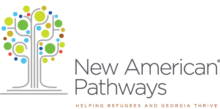At New American Pathways, we are excited to share the insights of Muzhda Oriakhil, Senior Community Engagement Manager at Friends of Refugees, Chair of the Coalition of Refugee Service Agencies (CRSA) in Georgia, and a proud graduate of the Civic Pathways program. Muzhda’s journey from Afghanistan to becoming a leading advocate for refugees and immigrants in Georgia is a powerful story of resilience, passion, and community building.
What is your name and job title?
My name is Muzhda Oriakhil, and I serve as the Senior Community Engagement Manager at Friends of Refugees. I also have the privilege of serving as the Chair of the Coalition of Refugee Service Agencies (CRSA) in Georgia.
Where are you from? And/or what is your background?
I come from a proud Afghan background and bring with me the lived experience of navigating displacement, transition, and community rebuilding. My personal journey deeply informs the compassion, commitment, and cultural awareness I bring to my work with immigrant and refugee communities here in Georgia.
Why did you choose to work with refugees and immigrants?
Working with refugees and immigrants is not just a career for me—it is a calling rooted in empathy, identity, and resilience. I understand firsthand the challenges that newcomers face and the power of culturally responsive care and community support. I chose this path to help build systems of belonging, especially for women and families during the most vulnerable moments of their lives. I want to ensure they are not just surviving, but truly thriving in their new home.
When did you take part in the Civic Pathways program?
I participated in the Civic Pathways program in 2023, and it was a transformative experience that further fueled my leadership in advocacy, policy, and coalition building.
How has Civic Pathways shaped your work and career?
Civic Pathways gave me the tools, language, and confidence to take my advocacy to the next level. It helped me better understand the legislative process, build stronger relationships with policymakers, and amplify the voices of those we serve. Since completing the program, I’ve engaged more deeply in both state and federal advocacy efforts—coordinating visits to the Capitol, sharing community stories with decision-makers, and mobilizing around policies that affect immigrant and refugee families.
Tell us why it’s important to advocate.
Advocacy is essential because without it, stories go unheard, injustices go unchallenged, and communities remain invisible. Refugee and immigrant communities face unique barriers, and advocacy ensures that policies reflect their realities and potential. It’s also a powerful way to reclaim our narratives and push for equity and inclusion at every level.
What does it take to be an advocate for yourself, your community, or others?
To be an advocate, it takes courage, consistency, and community. You need to be deeply connected to the people you serve, grounded in their experiences, and willing to show up—even when it’s hard. It also requires building coalitions, sharing power, and continuously learning. As an advocate, you don’t just speak for people—you create space for them to speak for themselves.
What sets apart federal advocacy from state advocacy? How might one be an advocate at the federal level?
Federal advocacy often focuses on broader policy shifts that impact immigration systems, humanitarian protections, and funding for refugee programs nationwide. It requires a strong understanding of national priorities and collaboration with partners across the country. To advocate at the federal level, one can engage with congressional offices, participate in national advocacy days, submit testimony, or coordinate with coalitions like CRSA to elevate stories and data that matter. At the state level, advocacy is more immediate and local—focused on legislation that directly affects families in our neighborhoods.
What are some of the challenges immigrants and refugees face economically in Georgia?
Economic challenges include limited access to childcare, language barriers, credentialing issues for professionals from other countries, and lack of affordable housing. Many families struggle to find jobs that reflect their skills and education, while also navigating systemic inequities in healthcare, transportation, and financial systems. These barriers limit long-term economic mobility.
How does Georgia benefit from refugee and immigrant communities?
Georgia thrives because of its refugee and immigrant communities. They bring innovation, entrepreneurship, cultural richness, and a strong work ethic that fuels our economy and strengthens our neighborhoods. Whether in healthcare, food service, education, or business ownership, newcomers contribute immensely to our state’s vitality and resilience.
Is there anything else you’d like to talk about or add?
Yes—this work is personal, and it is powerful. As a community health worker, childbirth educator, and postpartum doula, I’ve witnessed the strength and dignity of refugee families every single day. As a coalition leader, I’ve seen what’s possible when organizations unite for shared goals. And as a woman with lived experience, I know that our advocacy is not optional—it’s necessary. I am proud of the work we’ve done, and I’m even more hopeful about what we can achieve together.
Muzhda continues to make an extraordinary impact in Georgia, leading with heart and wisdom. Through her advocacy, leadership, and dedication to supporting refugee and immigrant communities, she’s not only transforming individual lives but also shaping policies and systems to ensure a more inclusive and just future for all. Her work is a powerful reminder that advocacy is not just about fighting for others—it’s about creating spaces for everyone to thrive.

